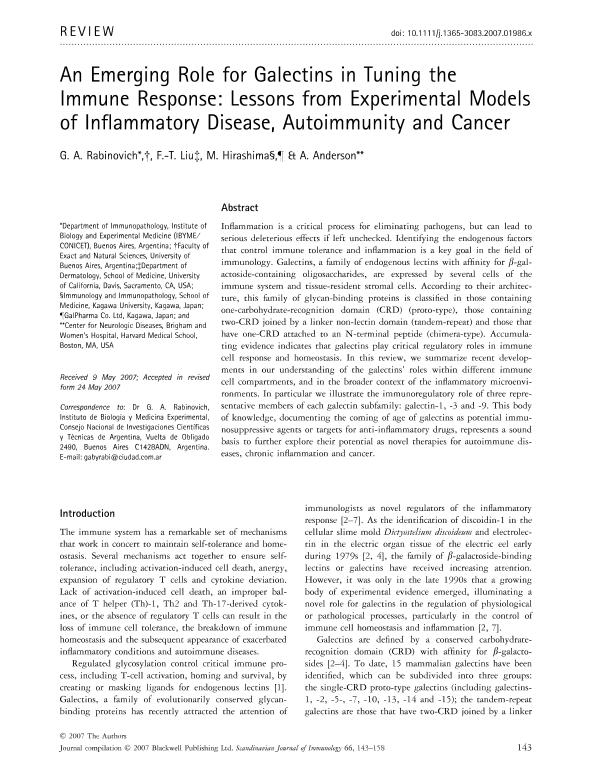Artículo
An emerging role for galectins in tuning the immune response: lessons from experimental models of inflammatory disease, autoimmunity and cancer
Fecha de publicación:
2007
Editorial:
Blackwell Publishing
Revista:
Scandinavian Journal Of Immunology
ISSN:
0300-9475
e-ISSN:
1365-3083
Idioma:
Inglés
Tipo de recurso:
Artículo publicado
Clasificación temática:
Resumen
Inflammation is a critical process for eliminating pathogens, but can lead to serious deleterious effects if left unchecked. Identifying the endogenous factors that control immune tolerance and inflammation is a key goal in the field of immunology. Galectins, a family of endogenous lectins with affinity for beta-galactoside-containing oligosaccharides, are expressed by several cells of the immune system and tissue-resident stromal cells. According to their architecture, this family of glycan-binding proteins is classified in those containing one-carbohydrate-recognition domain (CRD) (proto-type), those containing two-CRD joined by a linker non-lectin domain (tandem-repeat) and those that have one-CRD attached to an N-terminal peptide (chimera-type). Accumulating evidence indicates that galectins play critical regulatory roles in immune cell response and homeostasis. In this review, we summarize recent developments in our understanding of the galectins' roles within different immune cell compartments, and in the broader context of the inflammatory microenvironments. In particular we illustrate the immunoregulatory role of three representative members of each galectin subfamily: galectin-1, -3 and -9. This body of knowledge, documenting the coming of age of galectins as potential immunosuppressive agents or targets for anti-inflammatory drugs, represents a sound basis to further explore their potential as novel therapies for autoimmune diseases, chronic inflammation and cancer.
Archivos asociados
Licencia
Identificadores
Colecciones
Articulos(IBYME)
Articulos de INST.DE BIOLOGIA Y MEDICINA EXPERIMENTAL (I)
Articulos de INST.DE BIOLOGIA Y MEDICINA EXPERIMENTAL (I)
Citación
Rabinovich, Gabriel Adrián; Liu, F. T.; Hirashima, M.; Anderson, A.; An emerging role for galectins in tuning the immune response: lessons from experimental models of inflammatory disease, autoimmunity and cancer; Blackwell Publishing; Scandinavian Journal Of Immunology; 66; 2-3; 2007; 143-158
Compartir
Altmétricas




